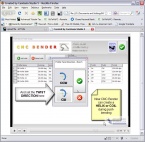Difference between revisions of "Push Bending"
From ATTWiki
(→Other Types of Bending) |
(→Other Pages) |
||
| Line 43: | Line 43: | ||
*See [[CNC Bender v11-20080424]] for information on the first version to enable Push Bending | *See [[CNC Bender v11-20080424]] for information on the first version to enable Push Bending | ||
| − | *See [[Push Bending Profile | + | *See [[Push Bending Profile Table]] |
Revision as of 14:00, 23 October 2008

A style of bending where the bend arm is moved positive a few degrees, then the tube is pushed through a set of rollers. This can be used to easily achieve a very large radius bend compared to draw bending.
Typically push bending uses a single roller on the clamp die assembly. That roller opposes a another roller that is placed where the bend die in rotary draw bending is normally placed. This roller can vary in size compared to the other rollers in the die assembly. Two more rollers of the same CLR as the front clamp roller are on the pressure die assembly. All four rollers rotate freely. The tube is pushed through these rollers to create the bend.
 |
As of April of 2008, our CNC Bender software can push bend as well as draw bend. We chose the Push Bending Profile Table approach to calculation of push bends. This approach uses a table of data that allows for easy setup and correction of bend angles. Correct the bend angle in the FRB menu and CNC Bender uses the profile information to calculate adjusted push bends. For more information on the initial CNC Bender release version, see CNC Bender v11-20080424 |
Video
 | View the Push Bend fabrication video 800x600 Windows Media Video file |
 | View the video CNC Bender Push Bending Profile Setup Menu Tutorial |
Other Types of Bending
Other Pages
- See CNC Bender v11-20080424 for information on the first version to enable Push Bending
- See Push Bending Profile Table